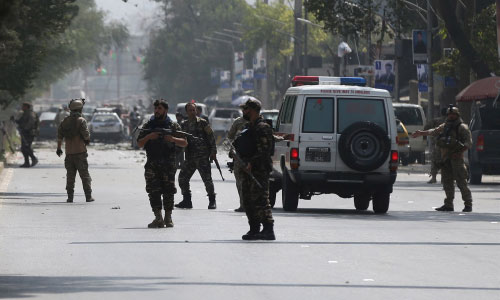KABUL - Cellphone street vendor Fazluddin doesn't much care that presidents, diplomats and Taliban commanders are squabbling over the U.S.'s withdrawal from his country after some 18 years.
It's not that he wants more war — deadly violence has shaken Afghanistan each of his 38 years — he just doesn't think that talking will make a difference.
"I’m very afraid it is going to get me one day," said Fazluddin, who like many Afghans goes by one name. “I’m not very optimistic because there is fighting all over the country.”Since 2001, when U.S.-led forces toppled the Taliban government after it harbored 9/11 mastermind Osama bin Laden, tens of thousands of civilians and security personnel, as well as more than 2,400 Americans, have been killed in Afghanistan.
Now, despite almost two decades of fighting, the Taliban control or hold sway in about half of the country.
Afghan officials and former U.S. officials have told NBC News that President Donald Trump’s envoy clashed with the Afghan government in recent days over the proposed U.S.-Taliban deal that could see 5,000 U.S. troops leave Afghanistan in 135 days.
There are currently about 14,000 U.S. troops in Afghanistan, advising Afghan forces and carrying out counter-terrorism operations against al Qaeda and ISIS militants.
But even if there is eventually a deal between the U.S. and the Taliban — which ruled between 1996 and 2001 — many Afghans are bracing themselves for more war.
One overriding worry is that once the U.S. leaves the Taliban will look to conquer parts of Afghanistan it does not control.
“The Taliban demanded all foreign forces should leave the country, maybe the Taliban is planning to attack the cities after the foreign forces withdraw,” said Tamanna Ahmadi, 20, who works in marketing.
Even this week as diplomatic negotiations hit a roadblock, the Taliban stepped up attacks in the country — killing both security forces and civilians.
The deadly blasts included a suicide bombing in Kabul on Monday and another Thursday that killed dozens, including a U.S. service member. Later Thursday, another suicide attack in neighboring Logar province killed four civilians, a spokesperson for the province said.
The attacks came as Amnesty International reported Thursday that Abdul Samad Amiri, the Afghanistan Independent Human Rights Commission’s acting director in Ghor province, was kidnapped and killed by the group.
In return for U.S. troops withdrawing, the proposed deal to end America's longest war would see the Taliban would agree to enter into peace talks with the Afghan government and pledge not to allow areas under their control to be used as a launching pad for terrorists.
Defense Secretary Mark Esper said Saturday that Washington would not accept just any deal.
"We will make sure we have a good deal, a good enough deal that guarantees at least the security of countries going forward and a brighter path ahead for the Afghan people," Esper said during a press conference in Paris.
But this week, nine former senior U.S. diplomats warned that Afghanistan could slide into an all-out civil war if the Trump administration withdrew all U.S. forces without a peace agreement.
Some Afghans said they thought regular citizens would resist any attempt by the Taliban to seize control.
"People will stand against the Taliban if they won't change, no one will accept them as they were in the past," said gynecologist Mahboba Yusfi, 47.
The Taliban regime was known for its strict interpretation of Islamic law and restrictive policies toward women, including barring girls from attending school and women for working outside the home.
“I can guarantee you 100 percent that people won’t have the freedom they have now, girls won’t be able to go to school, they won’t be able to work if the Taliban comes back,” said Ahmadi.
Others said they could cope with some restrictions as long as the Taliban allowed women to work and have an education.
"I don't care about how we have to dress, I don't mind wearing hijabs when the Taliban is back," said 22-year-old Tamanna Zamani.
"Peace is more important and a lot of people are dying everyday in Afghanistan." (AA)
Home » Afghanistan » As U.S.-Taliban Talks Falter, Afghans Brace for More Violence
As U.S.-Taliban Talks Falter, Afghans Brace for More Violence

